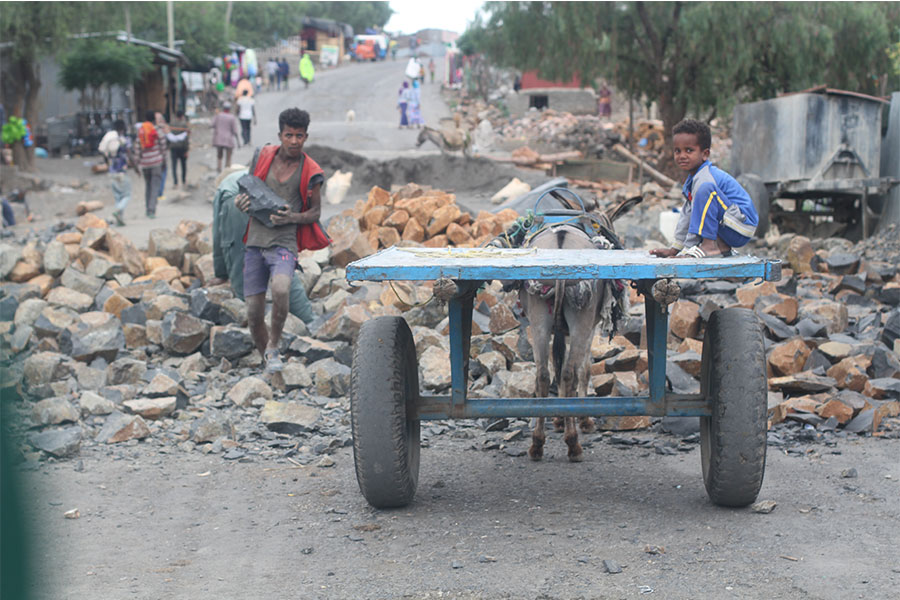
Sep 16 , 2023
By Stuart Walker
Climate change has become a time bomb, and the need to develop new ways of living that are far gentler on the planet has never been greater. But we stubbornly adhere to the same old mantra of innovation, technology, and unrestrained growth – offering lip service to sustainability while encouraging nature-destroying activities that rapidly make the planet unlivable.
Even “green” technologies accelerate production and promote consumption. Consider electric vehicles, bicycles, and scooters: manufacturing these goods requires more energy and resources and inevitably produces more emissions and waste.
What if we could build wooden houses without felling a tree? What if we could fish in such a way that left egg-producing females in the sea? And what if we could fill our forests with a wide array of edible plants, making commercially farmed forests look comparatively barren?
Though they may seem impossible, these practices have existed for centuries, suggesting that the future we need is to be found in our past.
While living in Canada, I had the opportunity to learn from its indigenous peoples. In the town of Port Hardy, on the northern tip of Vancouver Island, I met an indigenous fisherman at the municipal wharf, which was crowded with small fishing boats. He told me he used to fish for halibut until industrialised fishing decimated the stocks. Now, he fishes only for salmon, but those stocks are dwindling, too.
Before the Europeans arrived, indigenous peoples around the world had lived on their tribal lands for thousands of years; even after centuries of dispossession, many continue to be close to the Earth. They have learned, over generations, how to coexist with, rather than exploit, nature and developed highly sophisticated tools, mostly made of local materials. The design and utility of these tools reflect a deep knowledge of and respect for the natural world.
By comparison, our modern innovations often seem frivolous and irresponsible.
Take, for example, the humble halibut fishing hook. Mass-produced hooks, which can be bought for pennies, are not made to last and can be easily replaced – like many of today’s products. However, the traditional halibut hook of the Pacific Northwest is something else entirely.
This artefact seamlessly integrates many of the objectives we struggle to achieve in design today: functionality, sustainability, and conservation. It also embodies the creativity, artistic expression, ecological knowledge, spiritual beliefs, and cultural heritage of its indigenous makers. Perhaps most importantly, the hook is sized to catch only the male halibut, smaller than the female, thus preserving fish stocks for the future.
This approach to fishing, like traditional indigenous methods of boat building, house construction, and forest management, ensures the continuation of community-based practices, while simultaneously conserving the natural environment.
The good news is that through its Intangible Cultural Heritage lists, UNESCO supports safeguarding this type of local knowledge and know-how, which should play a foundational role in sustainable development. Indigenous practices can help us rebalance our values and recognize the importance of interdependence, the common good, localization, a more distributed economy, and biodiversity.
These are all critical aspects of economist Kate Raworth’s groundbreaking book “Doughnut Economics”, in which she critiques the dominant economic system and proposes an economics suited to the 21st Century. In the same vein, Wales, as a member of the Wellbeing Economy Alliance, is attempting to transform its economy to ensure a good quality of life for all and to achieve harmony with the natural world.
Transformation is progressing via a host of bottom-up (rather than centralized, top-down) initiatives, including local food production, swap shops, co-working spaces, “women’s sheds,” peppercorn rents for small businesses, local wealth-building projects, leadership training courses in nature-based wellbeing, and regular public-engagement panels.
As global warming accelerates, innovation must move beyond technological novelties whose primary purpose is to generate profits for shareholders. Tools like the halibut hook of the Pacific Northwest and the localization initiatives in Wales demonstrate the need for a different set of values. Embracing resilient and restorative design that respects and supports the environment, social equity, and cultural traditions, while also building a vibrant economy that benefits everyone, is the only way to create a future that lasts.
This article is provided by Project Syndicate (PS).
PUBLISHED ON
Sep 16,2023 [ VOL
24 , NO
1220]


My Opinion | May 24,2025

Life Matters | Dec 31,2022

Radar | Jul 20,2019

Commentaries | May 31,2020

Viewpoints | Apr 13,2024

Films Review | Jun 20,2020

Viewpoints | Oct 21,2023

Commentaries | Mar 09,2024

Viewpoints | Jul 27,2024

Viewpoints | Sep 01,2024

My Opinion | 131673 Views | Aug 14,2021

My Opinion | 128039 Views | Aug 21,2021

My Opinion | 126001 Views | Sep 10,2021

My Opinion | 123622 Views | Aug 07,2021

Dec 22 , 2024 . By TIZITA SHEWAFERAW
Charged with transforming colossal state-owned enterprises into modern and competitiv...

Aug 18 , 2024 . By AKSAH ITALO
Although predictable Yonas Zerihun's job in the ride-hailing service is not immune to...

Jul 28 , 2024 . By TIZITA SHEWAFERAW
Unhabitual, perhaps too many, Samuel Gebreyohannes, 38, used to occasionally enjoy a couple of beers at breakfast. However, he recently swit...

Jul 13 , 2024 . By AKSAH ITALO
Investors who rely on tractors, trucks, and field vehicles for commuting, transporting commodities, and f...

Jun 28 , 2025
Meseret Damtie, the assertive auditor general, has never been shy about naming names...

Jun 21 , 2025
A well-worn adage says, “Budget is not destiny, but it is direction.” Examining t...

Jun 14 , 2025
Yet again, the Horn of Africa is bracing for trouble. A region already frayed by wars...

Jun 7 , 2025
Few promises shine brighter in Addis Abeba than the pledge of a roof for every family...

Jun 29 , 2025
Addis Abeba's first rains have coincided with a sweeping rise in private school tuition, prompting the city's education...

Jun 29 , 2025 . By BEZAWIT HULUAGER
Central Bank Governor Mamo Mihretu claimed a bold reconfiguration of monetary policy...

Jun 29 , 2025 . By BEZAWIT HULUAGER
The federal government is betting on a sweeping overhaul of the driver licensing regi...

Jun 29 , 2025 . By NAHOM AYELE
Gadaa Bank has listed 1.2 million shares on the Ethiopian Securities Exchange (ESX),...